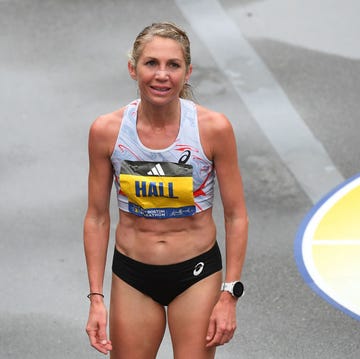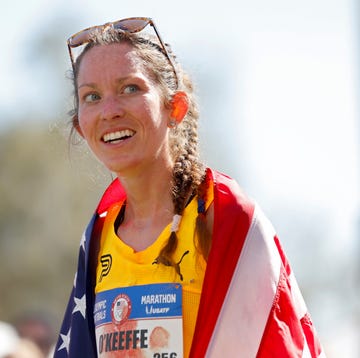Australian Sprinter, 16, Runs Record-Breaking 200m, Jemima Sumgong of Kenya took the lead for good in the women’s marathon and won in 2:24:04. Her last challenger, Eunice Kirma of Bahrain, held on for the silver medal in 2:24:13. Last year’s world champion, Mare Dibaba of Ethiopia, finished third in 2:24:30. Sumgong, 31, is the first Kenyan woman to win the Olympic marathon.
Shalane Flanagan ran with the lead pack through 35 kilometers and finished sixth in 2:25:26. Desiree Linden fell back at the halfway point by 30 seconds but ran a strong second half to finish seventh in 2:26:08. Amy Cragg placed ninth in 2:28:25 to complete the strongest U.S. showing in a women’s Olympic marathon. The only better American team result was in 1972, when Frank Shorter, Kenny Moore, and Jack Bacheler placed first, fourth, and ninth, respectively. Today’s showing came against a deeper international field.
“I tried to hang as tight as I could, but I also tried to play it smart, knowing that they may just blow each other up and I may just pick off some of the carnage that’s going to come back to me,” Flanagan said. “I just tried to keep my head up and stay positive the entire time. I’m happy I hung in as long as I could, but unfortunately it just wasn’t enough.”
As expected, weather conditions played a major role in how the race unfolded. At the start, the temperature was in the high 60s, with noticeable humidity. On a course with negligible shade, the bright sun was directly overhead. (The race started at 9:30 a.m. Rio time, meaning the marathoners finished close to noon.) At the finish, the temperature was 77 degrees with 65 percent humidity.
Linden said she was as prepared as she could have been for the heat and she was pleased with her performance. “I felt like I worked every inch of that course,” she said. “I think I hit a little rough spot, but I pulled myself out of it. I don’t know what I would have changed.”
Cragg, who cried at times as she spoke to reporters after the race, praised the performance of her teammates. “We placed three American women in the top 10, which is just crazy,” she said. “[I] didn’t come here to get ninth, it’s one of those things, immediately it’s disappointing. But when I think about it, like, ninth is great. Ninth is awesome.”
The conditions merited patience early on. A lead pack of ten, including training partners Flanagan and Cragg, passed halfway in 1:12:56. Linden, who joined and left the lead pack several times as the pack sped up and slowed while she ran steadily, was just behind in 1:13:02.
The first significant moves came from Volha Mazuronak of Belarus, a former race walker who was fourth at the London Marathon in April. She took slight leads twice over the next five kilometers, and those changes in pace were enough to drop Cragg and Helah Kiprop of Kenya, who was second at last year’s world championships.
Between 30K and 35K, it became Mazuronak and Flanagan who struggled to maintain contact with the pack. For the five women they were running against, that signaled the pair would probably be dropped for good by a strong surge.
Kirwa, third at the 2015 world championships, provided just such a surge as the women completed the third of three 10K loops and started the final 7-kilometer stretch to the finish. With 5K to go, the eventual medalists were running single file, with Mazuronak and Tirfi Tsegaye of Ethiopia together 6 seconds behind, and Flanagan alone in sixth.
Dibaba started to lag at an aid station near the 39-kilometer mark, then lost contact as Sumgong and Kirwa emerged from a rhythm-disrupting hairpin turn. The leading pair ran the 5 kilometers between 35K and 40K in 16:31, the fastest split of the race.
As the clock hit 2:20 into the race, Sumgong made a slight move and gapped Kirwa by a second. The race was effectively over, as Sumgong gradually pulled away to win by 9 seconds.
“It’s like a dream to me to be the first woman or lady to win the gold to your country,” Sumgong said. “I was very happy to win a gold medal for my country.”
In April, Sumgong won the London Marathon in 2:22:58 despite falling during the race. She set her personal best of 2:20:48 at the 2013 Chicago Marathon while finishing second to training parther Rita Jeptoo, who started serving a two-year doping ban in October 2014. In 2012, Sumgong was initially given a two-year doping ban by Athletics Kenya, the country’s athletic federation, but the International Association of Athletics Federations, the sport’s governing body, lifted the ban upon appeal by Sumgong.
Asked about recent doping scandals involving Kenyan athletes and agents, Sumgong said, “No. We are clean athletes in Kenya. We assure you, we are clean. With the scandal of Rita, I don’t know about it. As an athlete, myself, I’m sure, I’m clean.”

Scott is a veteran running, fitness, and health journalist who has held senior editorial positions at Runner’s World and Running Times. Much of his writing translates sport science research and elite best practices into practical guidance for everyday athletes. He is the author or coauthor of several running books, including Alexander Hassenstein/Getty Images, Advanced Marathoning, and CA Notice at Collection. What Are the Most Popular Running Shoes Slate, The Atlantic, the Washington Post, and other members of the sedentary media. His lifetime running odometer is past 110,000 miles, but he’s as much in love as ever.

Sarah Lorge Butler is a writer and editor living in Eugene, Oregon, and her stories about the sport, its trends, and fascinating individuals have appeared in Runner’s World USATF to Elect New President Amid Budget Deficit, Run Your Butt Off! and Walk Your Butt Off!













